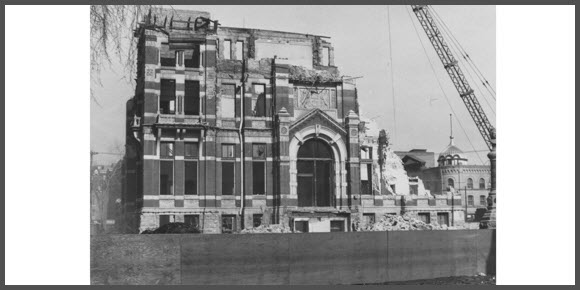by Bruce Cherney (part 4)
In 1956, the outcome of the civic election came as a total surprise by those who had foreseen the re-election of George Sharpe as mayor. Stephen Juba, then an Independent MLA, had no experience at city hall and had unsuccessfully run in two other mayoralty elections, including a 1954 loss to Sharpe.
The Winnipeg Free Press somewhat reluctantly endorsed Sharpe, primarily due to Juba’s lack of civic government experience and his alleged erratic behaviour during the campaign (his behaviour was actually an asset, since it got his name mentioned in numerous news reports), as well as Sharpe getting another chance to take action on his unfulfilled campaign pledges made in 1954. According to the newspaper, another two years in office would allow Sharpe an opportunity to make good on his earlier promises.
During his campaign, Juba refrained from making radio speeches and put up only a few posters. He would later boast that he spent just $25 on his campaign, while Sharpe spent $25,000.
Juba, the son of Ukrainian immigrants, received 46,197 votes to Sharpe’s 44,266. Most of his support came from the city’s ethnically diverse North End, and his election was seen as a major victory for the city’s non-Anglo-Saxon communities. One local newspaper described the result as a “big upset,” and provincial CCF (today’s NDP) leader Lloyd Stinson later called it “a pretty shocking experience for South Winnipeg,” the bastion of the city’s elite.
After the election, it was Juba who was front and centre during the new city hall debate. Above all, he was no great fan of the “gingerbread” city hall and the adjacent city market filled with butcher shops and garden farmers, emphatically saying on one occasion that he didn’t want to be working beside (expletive omitted) “chicken farmers.”
The question of a new city hall was “tossed into the laps of ratepayers Monday night (August 12, 1957),” according to the next day Free Press. The referendum was to be held during the October 23 civic elections.
City council had passed a $6 million money bylaw to build the city hall, although its site was still up in the air.
One of two sites to be voted on in the referendum was the Broadway land offered by the provincial government, while the second site was described as not being overly clear. The motion described the second site as being on land bounded by Market and James avenues and King and Princess streets.
Alderman (today’s councillor) Walter Crawford, the chair of the special committee for the city hall site, said it would have to be clarified at the next council meeting.
The only objection to the bylaw was from Alderman Slaw Rebchuk, who claimed it would impose an additional 1 1/2-mill rate levy on ratepayers for the next 20 years. Other aldermen challenged his figures, saying the increase would be significantly lower.
A September 11 Free Press article claimed Juba was given the task of being the “Pied Piper” for the new city hall vote. Juba warned council’s special city hall committee that his plans would be “very unorthodox,” including a program to recruit children to “sell their parents” on the project.
“If my son, when he was six years old, came to me and tried to tell me how I ought to vote on a money bylaw, I’d tell him to get out of here,” said Alderman Crawford.
Despite the concerns about the tactics Juba would use to promote the project, he was given the greenlight to head the “yes” campaign.
Juba Bares His City Hall Plan was the headline of a front page article in the September 17 Free Press. According to the article, Juba made public 12 points of his 13-point program to promote the city hall bylaw.
“The mayor’s point No. 2 seemed likely to be most contentious. This would set up a subcommittee of two aldermen and the mayor to check on speeches made by aldermen and to publicly challenge any attack detected.”
Essentially, the contentious point was designed to prevent dessension among aldermen in order to ensure the new city hall plan was passed in the upcoming referendum.
Furthermore, point No. 4 demanded that the aldermen publicly promise to “wholeheartedly endorse” the proposal.
Point No. 3 promised that no public funds would be spent on the project.
The points were designed to garner public support through various publicity campaigns, including one that would solicit merchants to award prizes for a children’s essay contest with the title, Why I Would Like a New City Hall.
An October 19, 1957, Free Press editorial urging Winnipeggers to vote for the bylaw, calling the existing city hall “a quaint travesty of a bygone age.”
The newspaper claimed that “if the bylaw fails now, it is anyone’s guess how many decades hence the aldermen could agree to put it forward again.”
The controversial issue of building of a new city hall had already been unresolved for nearly six decades.
The October 23 referendum was a virtual grandslam for a new city hall. Ratepayers voted 20,080 to 5,123 to fund the project. The vote in favour of the Broadway site was 24,918 to 15,360.
With that concensus, city engineers said it would take six months to organize an architectural competition and chose a plan for the project, another year to come up with detailed plans and another 1 1/2 years for the building to be completed. The engineers said the stages were contingent on everything going smoothly and the province agreeing to hand over the Broadway property.
But nothing ever went smoothly when it came to building a new city hall, especially when a new provincial government entered the fray.



